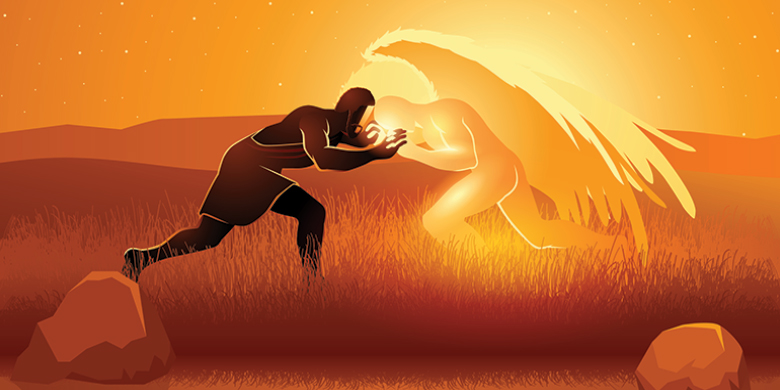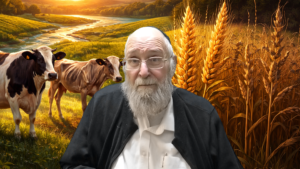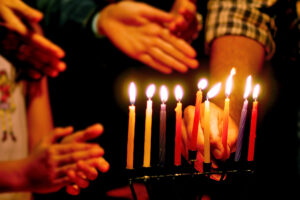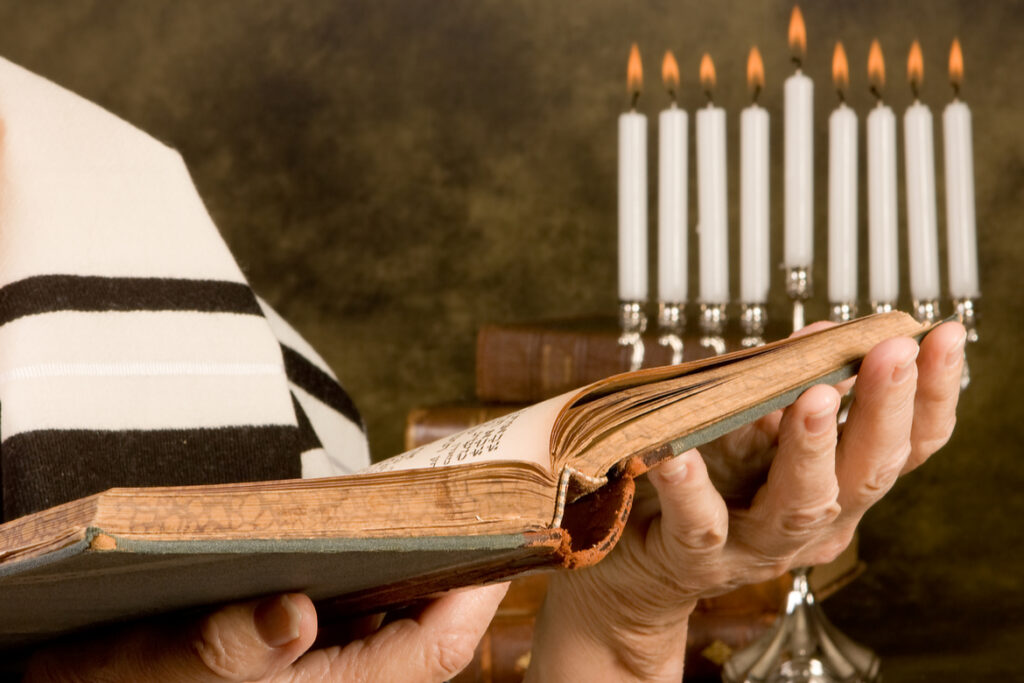- Faith ⬦ Read ⬦ Shabbat ⬦ Weekly Torah Portion
We’re Not Giving Up on You? – Parshat Vayishlach
It was a fateful night for the Nation of Israel. Jacob was fighting a nearly impossible battle. In the end, not only was Jacob not defeated, but he achieved an absolute victory that would result in no Jew every again being left in the dark. How does a person fight and win? This is the topic of this week’s parsha discourse.
This week’s Torah portion is parshat Vayishlach. The Torah relates that Jacob sent messengers to inform Esav that he had returned from the house of Lavan. In response, Esav came out against him accompanied by four hundred mercenaries to kill him. Jacob was horrified and split his camp in two, hoping to save at least part of his camp. Throughout the night he was busy moving his wives and children across the Yabok River. When he was left alone, a man came and attacked him and continued fighting with him until dawn. When the man saw that he could not hurt Jacob, he struck Jacob’s thigh and the injury left Jacob with a limp: “Jacob was left alone. A man wrestled with him until the break of dawn. He saw that he couldn’t overcome him, so he struck the socket of his thigh. Jacob’s hip joint became dislocated as he wrestled with him. And he [the angel] said, ‘Let me go, for dawn is breaking,’ but he [Jacob] said, ‘I will not let you go unless you bless me.’ So, he said to him, ‘What is your name?’ and he said, ‘Jacob.’ ‘No longer will your name be Jacob, but Israel, for you have battled with angels and with men and have been victorious’” (Genesis 32:25-29).
The whole parsha seems mysterious and puzzling. What do these things mean? Why did Jacob go back alone? Who is this man who came to fight him? And a further question: since when does a person ask for a blessing from someone who he was fighting against and who wanted to kill him?
Our sages explain the chain of events: Jacob had forgotten some “small vessels” when he was taking his wives and children over the river, and he retraced his steps in order to retrieve them. The man who fought with Jacob was an angel, Esav’s heavenly Minister, who wanted to harm Jacob. This was a significant battle for the Nation of Israel. In the end, Esav’s heavenly Minister failed to subdue Jacob, but he did manage to strike Jacob’s thigh and cause him to limp. The sun shone on Jacob and healed him from his lameness. Jacob then took hold of the hand of Esav’s heavenly Minister and caused him to be delayed, even though it was his turn to sing in Heaven (the song of the angels). In return for his release, Jacob demanded from him a blessing, that is, a confirmation and acknowledgment that the birthright and blessings he received from Isaac were undisputedly his. The angel, Esav’s heavenly Minister, was forced to admit that the blessings did belong to Jacob, and he called him “Israel” instead of “Jacob.” In other words, the blessings were not obtained by “Jacob” through deception and trickery but rather by “Israel,” who was revealed to be their true owner (Rashi, there).
So, now everything is becoming clearer. But there is more depth to that difficult and fateful night. Jacob fought a war on two fronts: with an angel, the heavenly Minister of Esav, on one hand, and with Esav and his four hundred hired men, on the other.
Rabbi Natan brilliantly sheds light on the situation and gives deeper meaning to the fateful struggle, based on the words of Rabbi Nachman. Rabbi Nachman teaches that by doing a mitzvah with joy, the holiness is completed, and the sadness is eliminated. The sadness combines with the forces of evil and the klippot which are located in the Chambers of Exchanges, where evil looks exactly like good, and good looks exactly like evil. The Chambers of Exchanges draw all their power from sadness. Doing a mitzvah with happiness awakens the power of all the worlds to return to G-d, which brings light, abundance, and great blessings to our world. Sadness is eliminated, and the side of holiness is completed, thereby raising the Shechina out of the exile. This is why it is written about the final redemption: “For you will go out with joy” since the happiness cancels out sadness and at the same time raises up all the sparks and vitality that have fallen into the “Side of Evil.” And thus the Nation of Israel will end the exile to begin the final redemption” (Likutei Moharan I, 24).
Let us explain the concepts regarding sadness and joy in practical terms. The evil inclination always tries to cause a person to sin, and after a he fails the test and sins, the evil inclination makes him fall into sadness, depression, and despair; its success depends on making the person feel sad. Conversely, being happy encourages a person to stand firm and not fall into sin. Moreover, even if he, G-d forbid, falls, as long as he remains happy and does not despair, he will have the best chance of fighting back and succeed in overcoming the evil inclination. When Rabbi Nachman taught that happiness has the power to cancel out the powers of evil and bring the redemption, he meant it literally.
Doing a mitzvah with happiness awakens the power of all the worlds to return to G-d, which brings light, abundance, and great blessings to our world!
Based on these concepts, Rabbi Natan explains the struggle between the heavenly Minister of Esav and Jacob: The main way in which the evil inclination desires to overcome the Nation of Israel and continually prolong the exile is through the power of sadness, as we have explained. The evil inclination tried to fight against Jacob, but when he realized that he would not be able to beat him, he damaged his thigh—meaning his offspring. This refers to the weaker souls of the Nation of Israel, who are in our generation—the last generation to spiritually battle against the base desires. This is an extremely difficult time fighting a spiritual battle against an enemy that has never been stronger. These souls are the aspect of the “thigh,” the final generation, known in Kabbalah as “raglin” (literally “the feet”) and are also known as “the footsteps of the Messiah.” The evil inclination uses the weapon of sadness against us to attack us and cause us to sin, and his whole aim is to make us despair and fall into sadness due to our sins, because his goal is to lengthen the exile indefinitely. We, the souls who are the aspect of the “raglin”, the generation of “the footsteps of the Messiah,” are actually the “small vessels” that Jacob did not give up on but went back to retrieve. Unfortunately, the evil inclination has had some success in causing the souls of the final generation of the redemption to “limp,” i.e. fall. First, he makes them fall into lust and evil desires, and then when they sink into these evil desires, he causes them to despair. And only then does he abandon them, damaged and without hope.

Since when does a person ask for a blessing from someone who he was fighting against and who wanted to kill him?
But not only did Jacob refuse to give up on these souls, but he endangered his own soul and fought a fiery angel with all his might so that joy should overcome sadness and so that the joy should be perfect. Not only would these weak souls not be tempted to listen to the evil inclination, but they would have the strength to overcome sadness and turn it into joy. This means that even after a spiritual fall and in the midst of despair and sadness, a person will continue to try and overcome these negative feelings, helping him become stronger and renewing his desire to fulfil the commandments with joy. This is the ultimate joy. It is both a victory over and a perfect answer to the battle of the evil inclination against these weak souls.
This is what happened when Jacob fought back and grabbed the angel, the heavenly Minister of Esav, whose time had come to sing in Heaven. The angel begged Jacob, “Send me away, for it is dawn, and I must sing.” But Jacob responded: “You want to make my offspring fall into sadness, yet you think you can go sing with joy in Heaven?” (The singing of the angels is considered an incredible joy, for the angels are called “malachei shachakim”—”heavenly angels” after the word “schok”—“laughter” (the word used here for heavenly and laughter have the same root letters in Hebrew) and happiness (see Likutei Moharan II, 5:10). Under no circumstances will I release you so that you will be able to make my offspring fall into sadness, and you are asking me to release you to go sing in Heaven? “I will not let you go until you bless me.” You will be forced against your will to bless me. A blessing means wholeness without sadness, as in the verse: “The blessing of G-d will bring riches, and toil will add nothing to it (Proverbs 10:22). This is a true blessing which contains no sadness. This means that you will be forced, against your will, to return all the sparks of holiness—all the joy that you tried to steal from my offspring by making them fall into sadness. You will have to pay a very hefty price and return all the sparks of holiness that have fallen into sadness and return everything to holiness.
Against his will, the angel replied to Jacob: “Jacob will no longer be your name,” meaning, it will no longer be that sadness will rule over your offspring, as in the verse, “and his hand was grasping Esav’s heel” (Genesis 25:26), meaning that the struggle would continue. Oh, No! “Rather Israel will be your name because you have fought against [an angel of] God and with men, and you have prevailed” (Ibid 32:29). You won the war. I have been compelled to return everything to complete holiness.
As we already said, we are not giving up on you!
(Based on Likutei Halachot, Birkat Hoda’ah 6)
- Birthrightblessings over foodbreslevBreslovDvar torah for parshat vayishlachesau vs jacobfeaturedfiery angelheavenly angelsJewishjudaismLikutey HalachotLikutey Moharanmalachei shachakimMinister of Esavnever give upParashat Vayishlachparshas vayishlachParshat VaYishlachprayerReb NosonRebbe NachmanThe Nation of IsraelTorahTzaddikvayishlachWeekly Torah Portion
- 0 comment






















